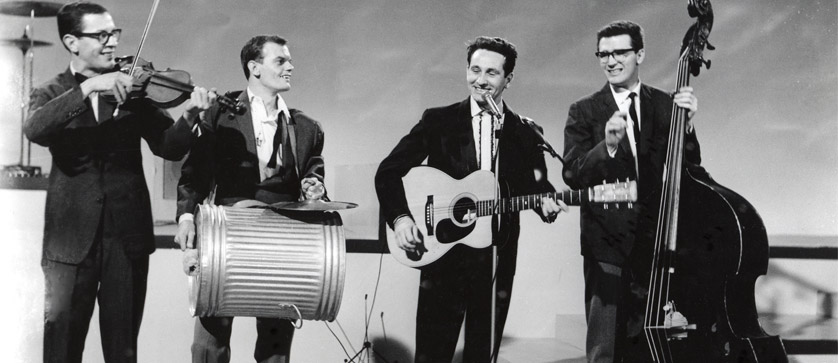Lonnie Donegan: My Old Man's a Dustman
As Britain's most successful and influential recording artist before The Beatles, Lonnie Donegan was the "King of Skiffle". He brought this 1950s' music genre out of the underground and into mainstream pop culture.
Skiffle is a type of folk music with a jazz and blues flavour that was popular in the US and the UK in the 1950s. It was played by bands who often incorporated instruments such as washboards into their repertoire.

© Pictorial Press Ltd / Alamy Stock Photo
Donegan's career lasted more than 50 years and he was described as "Britain's earliest pop idol". He had more than 90 hit singles - including his biggest commercial success, My Old Man’s a Dustman, in 1960.
Despite it reaching the number one spot in the UK, Australia, Canada and New Zealand, the novelty song was hated by many skiffle fans and was dubbed "music hall" by the critics. Although Donegan had a cool image and was part of the 1950s teenage culture, the quirky hit became the Glasgow-born singer's signature tune.
The dynamic performer was cited by 1960s bands, such as the Rolling Stones and the Beatles, as being one of their influences. He made regular appearances on the first TV music shows aimed at teens, Oh Boy and 6.5 Special. Donegan had 31 top ten hits in six years and was undoubtedly skiffle's biggest star.
<iframe width="100%" height="50%" src="https://www.youtube.com/embed/ODEShfdxoR0" frameborder="0" allow="accelerometer; autoplay; encrypted-media; gyroscope; picture-in-picture" allowfullscreen></iframe>
Early years
He grew up listening to country and western, swing, jazz and blues in the 1940s. After buying his first guitar at the age of 14 in 1945, the self-taught musician was playing live gigs around London at 17. He joined Ken Grinyer's Wolverines Jazz Band as a drummer and played the pub circuit.
Later, he teamed up with cornet player Ken Colyer in 1953 and they became the Ken Colyer's Jazzmen. Donegan became a fan of skiffle music and learned to play a tea-chest bass and a washboard, while singing cover versions of folk and blues songs.
Many established musicians resented the fact that skiffle bands (who were perceived as "primitive") were springing up and becoming hugely successful.
Donegan released his first record, a cover of Lead Belly's Rock Island Line, in 1954. His first UK number one was Puttin' On the Style in July 1957.
"Cor-blimey" trousers!
My Old Man's a Dustman, written by Donegan and his manager Peter Buchanan and released on Pye Records in March 1960, starts with the words, "My old man's a dustman, he wears a dustman's hat."
It was said to have been inspired by a World War I song, My Father was a Fireman, which started in a similar way and contained the same reference to wearing "cor-blimey trousers". This was the nickname of the baggy, shapeless trousers, made of moleskin or corduroy, worn by firemen, dustmen and coal merchants in the early 20th century.
Although fans and the music press tried to look for a hidden meaning in the song, there wasn't one - Donegan had simply wanted to perform a fun song that paid tribute to the British working man of the 1950s.
The song described how his old man lived in a council flat and was an "unsung hero" with a "heart of gold". Yet the narrator revealed his dad would mischievously drop rubbish from the bin on to the steps of any household who forgot to give him a Christmas tip!
Donegan continued playing live gigs literally until he died at the age of 71, after suffering a fatal heart attack in November 2002, while touring the UK. He will always be remembered as the King of Skiffle.
Modern bin Lorries
In the days of Lonnie Donegan's song, the binmen would lift the old-fashioned metal bins manually, using the strength of their arms alone to throw the contents into the back of the wagon. Today's wheelie bins are lifted and unloaded into the lorry using the power of hydraulics.
The binmen load the bins on to the lorry's hydraulic arm, which lifts and empties them mechanically. A compacting blade forces the rubbish into the body of the lorry, where hydraulic cylinders continually compact the waste. This means the bin wagon can carry a massive volume of rubbish in comparison with the pre-hydraulic days.
Phoenix Hydraulics is one of the UK's largest independent hydraulics companies. We stock more than 70,000 hydraulic components, including those used by modern bin lorries.
Contact Phoenix Hydraulics via our handy online form for details of our many products and services.
The Phoenix Hydraulics team would like to wish you all a very Merry Christmas and a Happy New Year!


